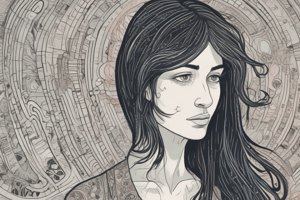Podcast
Questions and Answers
What are the two main types of symptoms experienced in OCD?
What are the two main types of symptoms experienced in OCD?
- Delusions and hallucinations
- Anxiety and depression
- Obsessions and compulsions (correct)
- Mood swings and irritability
What is a common effect of OCD symptoms on daily life?
What is a common effect of OCD symptoms on daily life?
- They enhance productivity at work
- They can take up at least an hour each day (correct)
- They are easily manageable without help
- They improve attention in school
Which of the following is NOT a common theme for obsessions in OCD?
Which of the following is NOT a common theme for obsessions in OCD?
- Need for alignment or order
- Worries about germs or illness
- Fear of being late (correct)
- Fear of harming oneself or others
People with OCD often realize that their thoughts and behaviors are not based in reality, yet they still feel compelled to:
People with OCD often realize that their thoughts and behaviors are not based in reality, yet they still feel compelled to:
What is the impact of intrusive thoughts associated with OCD on an individual's belief system?
What is the impact of intrusive thoughts associated with OCD on an individual's belief system?
What is the primary reason people with OCD act on their compulsions?
What is the primary reason people with OCD act on their compulsions?
Which statement about OCD is accurate?
Which statement about OCD is accurate?
What percentage of people in the United States are estimated to have OCD?
What percentage of people in the United States are estimated to have OCD?
How do symptoms of OCD differ from general habits or superstitions?
How do symptoms of OCD differ from general habits or superstitions?
What role does psychotherapy play in the treatment of OCD?
What role does psychotherapy play in the treatment of OCD?
What is a common compulsion experienced by individuals with OCD?
What is a common compulsion experienced by individuals with OCD?
What role do obsessions play in compulsive behaviors?
What role do obsessions play in compulsive behaviors?
What genetic factor may influence the development of OCD?
What genetic factor may influence the development of OCD?
Which of the following is NOT a noted risk factor for developing OCD?
Which of the following is NOT a noted risk factor for developing OCD?
How might irregular brain development contribute to OCD?
How might irregular brain development contribute to OCD?
Flashcards are hidden until you start studying
Study Notes
Obsessive-Compulsive Disorder (OCD)
- OCD is a chronic mental health condition characterized by obsessions (repetitive unwanted thoughts) and compulsions (repetitive behaviors).
- An estimated 2-3% of people in the U.S. are affected by OCD, as per the American Psychiatric Association.
- Compulsions are performed to alleviate anxiety caused by obsessions and are not based on personal choice, often disrupting daily life.
Symptoms of OCD
- Symptoms fall into two main categories: obsessions and compulsions; many individuals experience both.
- Daily impact: Symptoms can take at least one hour each day, affecting attention in school or work, and inhibiting participation in normal activities.
- Common obsessions include:
- Worries about contamination (germs, dirt)
- Fears of causing harm to self or others
- Intrusive thoughts related to sexuality or violence
- Need for organized or symmetrical environments
- Persistent doubts about safety or health of loved ones
- Common compulsions include:
- Excessive handwashing or cleaning
- Repetitive organization or counting
- Seeking reassurance from others
- Performing rituals until they feel "just right"
Causes of OCD
- The exact cause is unknown but may have genetic links, with a higher risk if family members have the condition.
- Brain development irregularities and serotonin dysregulation are associated with OCD.
- Risk factors include:
- Stress or trauma from various life aspects
- Personality traits like perfectionism and heightened sense of responsibility
Diagnosis of OCD
- Mental health professionals conduct thorough interviews to assess symptoms, including time consumed by obsessions/compulsions, impact on life, and relationship dynamics.
- Differentiation from other conditions is vital as other mental health disorders can present similar symptoms:
- Body dysmorphic disorder: Fixation on appearance.
- Trichotillomania: Urges to pull out hair.
- Generalized anxiety disorder: Persistent worries about everyday issues.
Distinction Between OCD and OCPD
- Obsessive-Compulsive Personality Disorder (OCPD) is characterized by extreme perfectionism and orderliness, distinct from OCD's intrusive thoughts and compulsive behaviors.
Living with OCD
- Many people with OCD are aware that their obsessions and compulsions are irrational but still feel compelled to perform rituals.
- Casual references to OCD can undermine the severity of the condition and the distress experienced by those suffering from it.
Studying That Suits You
Use AI to generate personalized quizzes and flashcards to suit your learning preferences.




